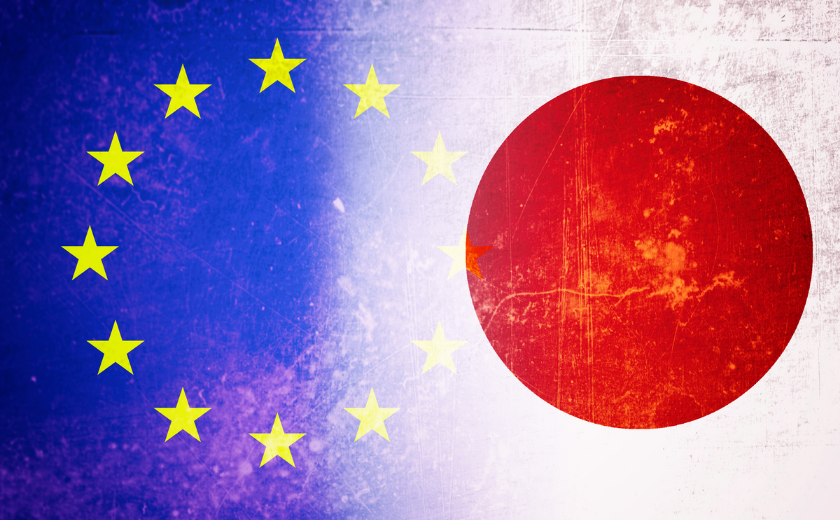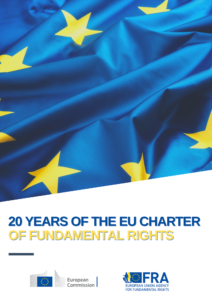
On May 27, 2021, the European Union and Japan held a virtual summit at which they pledged to enhance cooperation within the framework of their Strategic Partnership. It is particularly important due to growing tensions in the Indo-Pacific, including the East and South China Seas, and in the Taiwan Strait. Both democracies, also parties to the Economic Partnership Agreement (EPA), face the challenge of a dynamically growing China which for Europe is a partner, but also an economic competitor and a “systemic rival“. For Tokyo, Beijing is a powerful neighbor which questions the country’s sovereignty over some of its territories in the East China Sea.
On November 23, 2013, Beijing announced its Air Defense Identification Zone (ADIZ) over the East China Sea which caused concern in Tokyo and in Washington. The concern was all the greater as the ADIZ also covers the airspace over the Senkaku archipelago (in Chinese: Diaoyu), made up of five uninhabited islets and three rocks that Japan recognizes as an integral part of its territory and has them under its control. On the other hand, China and Taiwan consider these islets as part of their territory. The Japanese government issued “protest notes” to Beijing and held consultations with its main ally, the United States. The region of the Senkaku archipelago is critical due to the transportation routes of energy resources to Japan and China as well as fisheries and potential oil deposits.
New Era
Since then on, both Japan and the West gradually got to realize that a new era was on track in China’s foreign policy and its relations with Japan and the entire Indo-Pacific region. The timing was meaningful. Since November 2012, the Chinese Communist Party has been ruled by Xi Jinping, who in March 2013 took the chairmanship of the People’s Republic of China. His signature idea has been a “Rejuvenation of the Chinese Nation”, which in international practice translates into an assertive policy towards neighbors and the region.
Almost simultaneously – in December 2012, Shinzo Abe took the prime minister’s office in Japan for the second time, with the famous slogan “Japan is back”. Abe, also known for his economic recovery program “Abenomics”, made it clear that Japan remains the guardian of global commons, including seas, open enough for all to benefit from. He also announced closer cooperation “with the US, Korea, Australia and other like-minded democracies throughout the region.”
Openly voiced concerns of Japan about security and territorial integrity in the East China Sea led to a remarkable declaration by US President Barack Obama on his visit to Japan in April 2014. He made it clear that the US treaty obligations with respect to the security of Japan (treaty of June 1960) are “absolute”, “and Article 5 covers all territories under the Japanese administration, including the Senkaku Islands”. The dispute between Tokyo and Beijing results in regular flights of Chinese fighters over Senkaku / Diaoyu airspace, and according to reports from the Japanese government, Chinese ships also enter the country’s waters around Senkaku. Japan, for its part, has stepped up coast guard and air force patrols.
South China Sea
The situation in the East China Sea is just part of a larger picture related to Beijing’s new, assertive regional policy. Tokyo is increasingly worried about the Chinese expansion in the South China Sea (SCS) where Beijing claims 90% of that critical area through which more than 30% of world oil trade flows. In Beijing’s narrative, “China’s sovereign rights over the South China Sea islands have a solid historical and legal basis.” However, those claims were rejected by the award of the Permanent Court of Arbitration in The Hague (the arbitration case filed by Philippines) in July 2016, which also found that “China has violated the sovereign rights of the Philippines in their EEZ by (a) interfering with Philippine fishing and exploring for oil, (b) building artificial islands; and (c) not preventing Chinese fishermen from fishing in this zone” . Beijing declared that ruling as “null and void”. In reality, this is the large-scale construction of artificial islands that leads to de facto Chinese domination of SCS. It’s worth noting that Beijing has been trying to conduct a bilateral dialogue in the region, avoiding multilateral talks, e.g. within ASEAN, as it would strengthen the negotiating position of the Philippines, Vietnam and Malaysia with regard to violating the sovereignty of their territorial waters in the SCS.
Japan’s position on the South China Sea is clear. Tokyo rejects Beijing’s claims that “the drawing of territorial sea baselines on the relevant islands and reefs in the South China Sea conforms to UNCLOS [1982 United Nations Convention on the Law of the Sea] and general international law” . The Japanese say that China attempts to limit the freedom of overflight in the disputed basin. In practice, this means that Tokyo carries out missions in the SCS to help maintaining the freedom of navigation, overflights and international shipping which, of course, is met with protests by Beijing. The Japan Maritime Self-Defense Force also conducts military exercises in those waters with the participation of warships and submarines.
Tokyo is also working with its partners in the region, for example, providing Indonesia with patrol vessels to help prevent illegal fishing in the country’s exclusive economic zone (EEZ). In addition, in March 2021, Japan and Indonesia signed an agreement allowing arms exports to that country. In terms of wider regional relations, in 2015 Tokyo and Manila raised their cooperation level to an “Enhanced Strategic Partnership“, strengthened by agreements on maritime security and defense technology transfer. Furthermore, in October 2020, the new Japanese cabinet with Prime Minister Yoshihide Suga clinched a deal with Vietnam on the transfer of military equipment and technology, as part of a widening security ties and economic relations.
“Quad” and the European Union’s role
The deteriorating situation in the Indo-Pacific and a perceived threat of a “Cold War 2.0” prompted in February 2017 Japan, India, Australia and the United States to restart the so-called Quad, a forum for dialogue and cooperation in the field of regional security, launched in 2007 by Tokyo. Its objectives are reflected in the Joint Statement of its leaders, “The Spirit of Quad“, issued at the first summit on March 12, 2021, in which they commited to “to promoting a free, open rules-based order, rooted in international law to advance security and prosperity and counter threats to both in the Indo-Pacific and beyond. ” Of particular value is the declaration of support for the ” rule of law, freedom of navigation and overflight, peaceful resolution of disputes, democratic values, and territorial integrity”. which is part of this statement. It can be read as a commentary on the disputes in the East and South China Seas.
The European Union does not participate in the Quad but its strategy fits in with the objectives of that forum. This is especially visible in the cooperation between Brussels and Tokyo. On January 25, 2021, Motegi Toshimitsu, Japanese Minister of Foreign Affairs, attended the EU Foreign Affairs Council, an unprecedented event in the history of that body. He presented Japan’s position on the situation in the Indo-Pacific.
Japan is among the countries with which the EU carries out its project “Enhancing Security Cooperation in Asia and with Asia“. It covers cooperation with Asian partners in cybersecurity, maritime security, crisis management, and counter-terrorism. The European Union and Japan are linked by the Strategic Partnership Agreement, concluded in July 2018 together with the Economic Partnership Agreement. Its principles were strongly emphasized again at the 27th EU-Japan Summit, held in a virtual mode.
On 27 May 2021, leaders of Japan and EU decided to “enhance cooperation for a free and open Indo-Pacific” which is unconstrained by coercion. It was also announced that both sides would intensify their cooperation with ASEAN and the South Asian and Pacific island countries. The statement was an allusion to the Chinese expansion in the region. In this context, a clear declaration was made. Tokyo and Brussels expressed “serious concern” about the situation in the East China and South China Seas and their “strong opposition to any unilateral attempts to change the status quo and increase tensions.” Importantly, both parties also highlighted the issue of stability in the Taiwan Strait. Nowadays, it is gaining more and more attention due to the statements by the Chinese leader Xi Jinping, who, on the occasion of the recent centenary celebrations of the Chinese Communist Party, once again mentioned the “reunification” of Taiwan with China.
It is worth noting that in the field of security in the Indo-Pacific, there have been some joint initiatives of Quad members and some European countries, which may lead in the future to an extension of this initiative to, for example, France. In April 2021, a French Navy-led La Pérouse exercise took place in the Bay of Bengal, involving Japan, the US, Australia and – for the first time – India. The drills took place after the first Quad leaders’ summit.
Bilateral cooperation between Japan and Germany is also gaining momentum. On April 13, 2021, the foreign affairs and defense ministers of both countries held their first meeting in a “2 + 2” format. Such talks have been also held between Tokyo, Paris and London. Discussed was “the possibility of bilateral cooperation on the occasion of the deployment of the German Navy frigate, including joint exercises as well as monitoring and surveillance activities against illicit ship-to-ship transfers by North Korea-related vessels”. The frigate “Bayern” on its six-month mission, which will start in August 2021, will enter Pacific waters and make calls at Japanese ports. However, it will not enter the South China Sea before visiting the port of Shanghai in China, which may call into question the entire symbolism of the mission – despite possible exercises with the Japanese navy.
Author: dr Bruno Surdel, analyst, Centre for International Relations.
[evc_interactive_banner type=”classic” custom_link=”url:https%3A%2F%2Fmastersandrobots.tech%2F|||”]



